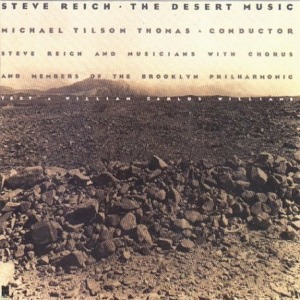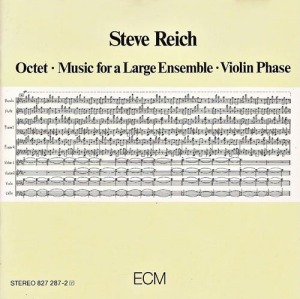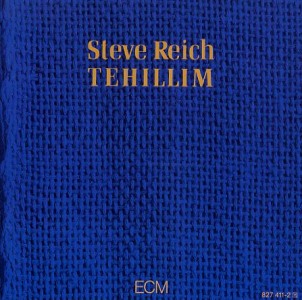Steve Reich – The Desert Music LP – Elektra, 1985 – $6.50 (Mystery Train, 5/16

I find myself sticking with a few of Steve Reich’s pieces more than others, specifically Music for 18 Musicians, Octet / Music for a Large Ensemble / Violin Phase, and Six Marimbas, but it wasn’t until I picked up The Desert Music that I understood why. Those pieces were all composed in the 1970s and are formative explorations into minimalism. There isn’t a prevailing theme to Music for 18 Musicians, it simply goes. Those compositions set up the rules, the boundaries, and the elements for Reich’s later releases.
His major compositions in the 1980s—Tehillim, The Desert Music, and Different Trains specifically, for the simple reason that I own and have heard them—apply topical themes to these elemental templates. Tehillim evokes Reich’s Jewish heritage; The Desert Music follows William Carlos Williams’ poetry into the very idea of deserts; and Different Trains juxtaposes Reich’s frequent train trips in 1939–41 with those of European Jewish children headed off to Nazi death camps during the Holocaust. It’s heady, important stuff, especially Different Trains, and I commend Reich for taking this direction. He could have easily been content to explore the form’s more distant corners with different instrumentation (like Pat Metheny’s guitar performance of Electric Counterpoint that follows Different Trains on the LP) or plied his trade on film soundtracks, but bringing an emotional, personal, and historical resonance to his compositions is far more rewarding. More recently his 2006 release Daniel Variations focused on Daniel Pearl, the Jewish-American journalist beheaded by a Pakistani militant group in 2002.
The disconnect between Reich’s elemental 1970s compositions and his thematically charged 1980s compositions comes down to ease of listening. When I reviewed Octet / Music for a Large Ensemble / Violin Phase last year, I called it “remarkably flexible music,” noting how I frequently listened to it while working, driving, or reading, not just in active-listening scenarios. Whether Different Trains works in these passive contexts is up for debate, but it’s difficult to ignore the thematic arc of that release. The Kronos Quartet’s stuttering strings are just as disconcerting as the conversation snippets. Tehillim faces a different hurdle: I don’t share Reich’s Jewish upbringing. While that didn’t stop me from enjoying Mogwai’s “My Father My King,” I suspect that Tehillim is a far richer experience with the proper background.
On the surface, The Desert Music isn’t much of an exception. Selections from William Carlos Williams’ poetry, specifically “The Orchestra” (reading) and “Theocritus: Idyl I—A Version from the Greek” from his own The Desert Music and “Asphodel, That Greeny Flower” (reading), provide the text for the choir. Reich cites a particular section of “The Orchestra” as being thematically critical: “Say to them: / Man has survived hitherto because he was too ignorant / to know how to realize his wishes. Now that he can realize / them, he must either change them or perish.” Williams wrote this poem in the wake of the nuclear bombings at Hiroshima and Nagasaki, so desert applies both to the New Mexico testing grounds for the weapons and the lifeless aftermath from the fallout. Reich also cites two other deserts—the Sinai, where the Jews entered after their exodus from Egypt, and the Mojave desert in California, which Reich had visited on several occasions. Much like Different Trains and Tehillim, The Desert Music brings together strands of history, culture, and personal experience.
Yet Reich makes another key point in the liner notes: “All pieces with texts [have] to work first simply as pieces of music that one listens to with eyes closed, without understanding a word. Otherwise, they’re not musically successful, they’re dead ‘settings.’” More so than Tehillim or Different Trains, The Desert Music fulfills this requirement. This point is no slight against those other pieces, rather an important recognition that their texts are harder to ignore, especially the spoken extracts of Different Trains. I would further argue that Different Trains’ narrative accounts need to be hard to ignore. The poetic tracts of The Desert Music, on the other hand, aren’t the principle layer of the compositions. They add to the initial listening experience, which covers the promise of the American West, the foreboding darkness of Hiroshima, and the struggles of the Sinai. Returning to the cited WCW passage, the idea of realizing wishes and then having to change them applies in all three contexts in different ways, but with similar potential outcomes. The Desert Music is thematically charged, yes, but in a way that continues to open up avenues of conversation.
The jury is still out on whether The Desert Music join Reich’s 1970s compositions in my heavy listening pile. The emphasis on the chorus, whether singing the Williams poetry or wordless melodies, is a major difference from the pulsing usage of human voice in Music for 18 Musicians, and goes against my usual preferences, although I do enjoy it here. Going back to the idea of elemental Reich vs. thematic Reich, The Desert Music seems too full, too symphonic to properly compare with the elemental minimalism of Music for 18 Musicians. With the application of a theme, even a flexible, conversationally oriented theme, the overall scope expands. Whether that scope fits as many listening scenarios as my favorite Reich pieces is doubtful, but I don’t feel close to being done with The Desert Music.
Note: the 2001 CD pressing of Tehillim / The Desert Music by Cantaloupe Music features a different performance of each piece.
|
110. Steve Reich – Octet / Music for a Large Ensemble / Violin Phase LP – ECM, 1980 – $10

I first heard Steve Reich during my final year of graduate school, or early 2007 for those of you who don’t keep track of things based on events in my personal life. I can’t remember if there was a specific recommendation that I followed or just a general sense of “I like Philip Glass, Steve Reich seems to be the next logical step” afoot after getting the former’s Glassworks from the Got Books Charity Sale, but Music for 18 Musicians (view linked YouTube of the first ten minutes for a taste) was immediately impressive. It’s telling that I rarely go back to Glassworks now, since I so greatly prefer Reich’s Music for 18 Musicians, Six Marimbas, and Octet / Music for a Large Ensemble / Violin Phase. It’s remarkably flexible music: it helped me maintain focus while writing the final few academic papers of my life (I presume); it’s fast-paced enough for driving music (“Violin Phase” excluded); and it’s detailed enough for general sitting and listening. It’s also unlikely to offend anyone, a consideration that I occasionally recognize.
Returning to the specific genre tag, it’s difficult to reconcile the interlocked layers of “Octet” or “Music for a Large Ensemble” with my preexisting notions of minimalism. There’s certainly a reduction at work here; each repeated phrase is relatively short and the larger changes in the music come from the gradual shifts of each layer. Yet unlike something like Arvo Pärt’s Alina, which takes minimal in a more literal, barren meaning, Reich’s compositions never feel spartan. They’re both minimal and buzzing with life. Even on a piece like “Violin Phase,” which contains only three phased violin performances, there are no moments of pause, no breaks from the action.
If I had to choose a favorite pieces from this set, it’s “Octet.” Whereas the individual instruments in “Music for a Large Ensemble” are more locked into the piece’s overall structure, individual performances stand out in “Octet.” Whether it’s the droning cello lines anchoring the piece, the intricate bass clarinet parts that taking focus every few minutes, or the melodic dominance of the flutes, the increased separation between the instruments helps separate “Octet” from both Music for 18 Musicians and “Music for a Large Ensemble.” Does that mean that I’d recommend starting with this LP before Music for 18 Musicians? No, but it’s a nice second choice.
Wait! If you’re not interested in hunting down out-of-print vinyl, Reich’s Phases box set is a great deal. $35 (or less) for five discs, it contains newer recordings of Music for 18 Musicians, Drumming, and “Octet” (presented here as “Eight Lines”), and the original recordings of Desert Music, Tehillim and Different Trains / Electric Counterpoint (the latter with Pat Metheny, although both are excellent), among many other pieces. It’s hard to imagine a better gateway to Reich’s various approaches, even if it’s not comprehensive.
|
|
Having an iPhone with the Yelp app at my side is a huge boon to my record shopping impulses, since I can wander around a city far more effectively now. I’d searched for stores near Neumos and found a record-selling thrift store around the corner, but I never got over there. Instead I was sucked into the Jive Time Records annex in Atlas Clothing, a trove of vinyl that felt less picked over than some of the other used records stores I’d visited here. The bins of $.99 and $3.00 LPs consisted of well-worn favorites, but the regular-priced lots had some finds amid the complete discography of Steely Dan. Like any number of other record-collector oriented spots, these records had a tendency to be a touch overpriced, like the Afghan Whigs’ Turn on the Water 12” going for $15, but I was happy with the price of the two albums I picked up.
39. Steve Reich – Tehillim LP – ECM, 1982 – $8

Aside from a copy of Different Trains / Electric Counterpoint, I’ve had a hard time finding Steve Reich LPs. Record stores switch between lumping him and his peers (Glass, Riley) in with traditional classical music, putting them in a contemporary composers section, or slotting them in an experimental bin. If I manage to find that location, it’s typically comprised of Philip Glass’s Glassworks and Songs from Liquid Days (his collaboration with pop songwriters like Paul Simon, Suzanne Vega, David Byrne, and Lori Anderson), not Reich’s Music for 18 Musicians or Octet – Music for a Large Ensemble – Violin Phase. Those Glass records are the popular entry point to this style of repetitive minimalism, so it’s hardly a surprise that there are more of them floating around (and that people are more likely to get rid of them). When Jon pulled a copy of Tehillim, a 1982 composition inspired by Hebrew psalms, out of the contemporary composers section, I gladly snapped it up. Would I have been more excited with one of those aforementioned LPs? Of course, but beggars can’t be choosers.
40. Table – Table LP – Humble, 1995 – $6

Having found one of Table’s singles at Mystery Train last summer, I figured that I might finally stumble across their long out-of-print full-length album after years of searching. I just didn’t expect it to be in Seattle. There’s a certain logic in finding a Chicago math-rock LP on the other side of the country after striking out numerous times in Chicago—Chicagoans are more likely to grab it when they see it, since they know what it is, even though there are more copies floating around in that area—but my instincts are always to look for local acts like Joel R. L. Phelps or Kilmer, not Midwestern rarities. The flip side of this equation is how many Live Skull LPs I saw in all four record stores; I thought that they were relegated to the northeast.
|
|
I finally finished loading up my iPod for the second round of iPod Chicanery. This time there are 1251 songs lasting for 3.4 days. I’ve used the forethought this time of creating a “Continuing Random” playlist at the start that I’ll keep paring down as I update the project (which should be around every 100 songs).
So what ended up on the playlist this time? Part of me thinks it’ll be better to reveal the contents as they come up, but I’ll divulge a few of the picks now. I did a fair amount of research into which records I’ve inexplicably missed, which records fulfill genre holes in my listening habits, and which records will mix up the flow nicely, so those choices will probably be the ones that immediately come to mind.
Most Likely to Cause Car Accident: I decided to include Stars of the Lid’s And Their Refinement of the Decline—all two hours of it—since it nicely bridges the gap between ambient and minimalist classical. The examples of those genres that I included for the last round, Eluvium and Philip Glass respectively, often made me relax during morning commutes, so hopefully that will be the result again, not fiery death.
Lungfish Selections: I’ve slowly been making my way through Lungfish’s impressive catalog and opted to include three releases that I’m only vaguely familiar with for this round: Artificial Horizon, Pass and Stow, and Necrophones. I can’t think of any other artist who eked three albums onto the iPod, but Lungfish displayed remarkable consistency with the picks of Rainbows from Atoms, Indivisible, and The Unanimous Hour for the last round.
Taking Cues: I ended up stealing ideas for jazz records to include from Floodwatchmusic, namely Miles Davis’s live album Agharta, Bobby Hutcherson’s Components (since Montara was not easy to track down), and John Coltrane’s Meditations. These are joined by Herbie Hancock’s Thrust, which I had picked up on vinyl a few weeks ago, and Ornette Coleman’s The Shape of Jazz to Come.
New Releases: I didn’t want this round to be all 2007 releases, but the new Battles, Narrator, Shannon Wright, 65daysofstatic, Twilight Sad, Pelican, Mary Timony Band, Caspian, Berg Sans Nipple, Errors, and Stars of the Lid albums all made it onto the playlist. My apologies to Wilco, Nina Nastasia, the Arcade Fire, Jesu, and Trans Am records and any other amazing records that manage to leak in the next three months. I’ll have to listen to you on my laptop.
Album I’m Most Excited to Hear: Since getting into Philip Glass’s minimal work, I’ve been trying to track down other solid releases in this vein, and Steve Reich’s Music for 18 Musicians came up as the dominant example. I initially downloaded the 1978 ECM version, which was only one track and 56 minutes long. Well, as much as I like a challenge, I gladly opted for the more recent Nonesuch recording, which is longer, but is also broken up into more manageable sections. I’ve been absorbed by this album since downloading it, so I’m quite eager to hear how it mixes with the other material on the playlist.
Those are all the spoilers you’re getting for now. I haven’t even divulged which eight rap albums made it on—only five are Wu-Tang Clan related!
|
|

